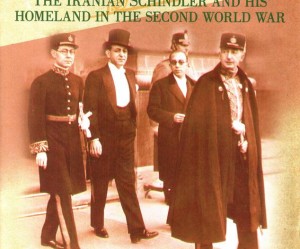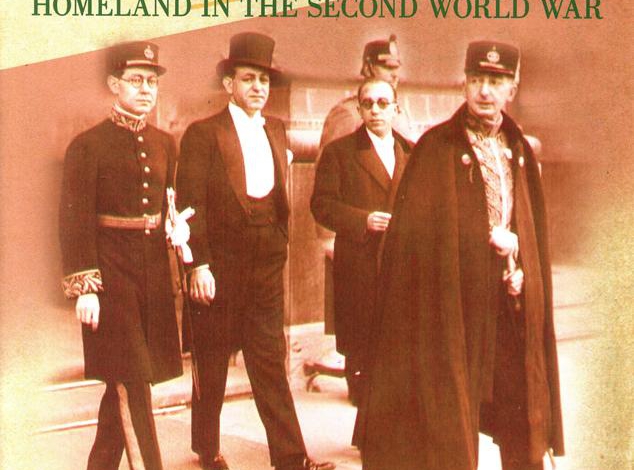 On International Holocaust Remembrance Day, when the world remembers the tragedy of the Holocaust, the story of Abdol Hossein-Sardari, the Iranian consul in Nazi-occupied France during the war, strikes a chord. Not only does it recall Oskar Schindler, the German businessman who inspired "Schindler�s List", the 1993 Oscar-winning film by Steven Spielberg; it may have been even more daring than �Schindler's use of his good relations with the Nazis to employ hundreds of Jews in his factories, shielding them from death after the German invasion of Poland in 1939.
On International Holocaust Remembrance Day, when the world remembers the tragedy of the Holocaust, the story of Abdol Hossein-Sardari, the Iranian consul in Nazi-occupied France during the war, strikes a chord. Not only does it recall Oskar Schindler, the German businessman who inspired "Schindler�s List", the 1993 Oscar-winning film by Steven Spielberg; it may have been even more daring than �Schindler's use of his good relations with the Nazis to employ hundreds of Jews in his factories, shielding them from death after the German invasion of Poland in 1939.Sardari actually managed, in his correspondence with German authorities, to officially classify hundreds of Iranian Jews living in France as unrelated to Judaism.
An incredible effort in itself, what happened over 70 years ago in Rue de Fortuny 5, the Parisian address of the Iranian consulate at the time, appears even more extraordinary today that the state founded by some of those Holocaust survivors, Israel, has hostile relations with Iran.
According to �In The Lion�s Shadow,�a book on Sardari's life by Iranian author and journalist Fariborz Mokhtari, the young diplomat's charming personality was key in persuading the Germans of his outlandish claims.
The lavish banquets he hosted at the embassy won him the trust of the Nazi commander, and of senior German diplomats who had served under the German Empire and did not agree with Adolf Hitler�s racial policies.
It didn't hurt that the plateau of Iran, which in Farsi means the �Land of the Aryans�, was, in Hitler�s eyes, the cradle of his ideology centered on the mythical Aryan race. The Persian kingdom had also had a flourishing trade relationship with Germany since the end of 19th century.
While befriending the Germans who had invaded France in 1940, Sardari also became close to the numerous Jewish families who had expanded their thriving businesses under the Shah in Iran by opening new stores in France.
When the full brunt of the Nazi racial laws hit France, where in October 1940 Jews were banned from employment in education, the judiciary, military and the press, Sardari went into action.
Turning the slowness of the German bureaucracy to his advantage, he developed a strategy to keep the Germans busy verifying his claims about the Mosaique Iranians -- which, of course, were completely his creation.
In an August 1942 letter to the Secretary of the German Embassy in France, Krafft von Dellmensingen, Sardari wrote:
� [...] Some of the sixteen million Iranians, all brothers and sisters of the same origin and racial stock, are converts to the Mosaique faith [...] The habits, customs and morals of Mosaique Iranians are indistinguishable from those of Muslim Iranians. [...] They may have a different spiritual belief but their faces are oval with evenly distributed features, relatively low foreheads, straight noses, red or light brown lips that are often thin and frequently blue eyes [...] In other words, they are descendants of the Aryan Indo-European race, with no relationship to the European Jewish race.�
While the Nazis checked out these outlandish statements, a Persian carpet dealer, Ibrahim Morady, drafted a list with the names, jobs and addresses of all the Iranian Jews of Paris. Sardari filed it with the German authorities, saying it was the list of those "Djougoutes" of Iran.
By the time Adolf Eichmann -- the head of the SS racial department and the mastermind of the mass extermination of millions of Jews -- replied in a letter to the German Embassy in Paris in December 1942 that any distinction between Persian and European Jews had to be rejected, Sardari had already secured the safety of one hundred Iranian Jewish families.
Life in Iran hadn't always been easy for the Jews, though. �There were minor pogroms and forced conversions imposed on the population in Mashad, Ishafan, and Tabriz, between the 19th and the 20th century�, said Meir Litvak, professor of Middle Eastern studies at Tel Aviv University.
�The hatred against Jews was rooted primarily in the Shiite tradition saying that Jews were impure and could contaminate water and food, putting the lives of Muslims at risk�.
�Sardari was exceptional because he spent himself for the Jews when Iran and Germany were in good terms, but also later when they were at war and he had lost diplomatic immunity�, said author Eliezer "Geizi" Tsafrir, formerly the chief of the Tehran station of the Israeli secret service, the Mossad.
In June 1942, when Iran declared war on Germany after the British and Russian armies invaded the country despite its declared neutrality, Sardari found himself without any diplomatic, financial, and political support from home.
He did not give up, and used the hundreds of blank passports stored in a safe at the Iranian consulate for a number of French Jews, who thanks to the documents got safe passage together with their families.
Those heroic deeds didn�t earn Abdol Hossein Sardari fame, though, or even a comfortable end to his days.
After the war, he was prosecuted in Iran for overstepping his authority and later, in 1979, when the revolution brought Ayatollah Khomeini to power, he was stripped of his pension and property, as happened to many Iranians linked to the old regime.
Sardari died alone and in poverty in London in 1981. His story is barely known among the 20,000 Jews who live in Iran today, the biggest Jewish community in the Middle East after Israel itself.
Still, Iranian Jews - who are allocated one seat in the Majlis, the Iranian Parliament - are not allowed to remember the Holocaust, since the very historical fact of the Shoah is denied by Iranian leaders.
�Back in time, apart from the perception of impurity, the main reason for Shiites to hate Jews was the competition with the other minorities in a context dominated� by the Sunni strain of Islam. But today, anti-Semitism is a political card,� said Professor Litvak.
We don't know what Abdol Hossein Sardari would do today. But we can safely say that he would disagree with Iranian president Mahmoud Ahmadinejad, who has repeatedly called for the destruction of the Jewish state.
By International Business Times
The Iran Project is not responsible for the content of quoted articles.











